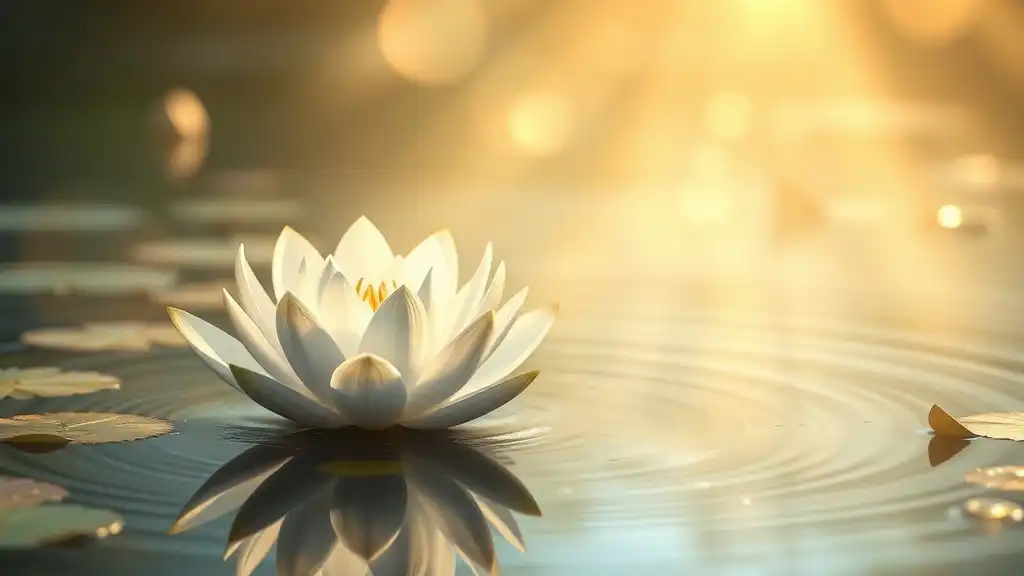Water has held a profound place in various cultures and religious traditions throughout history. Its importance goes beyond mere physical necessity; it embodies deep spiritual significance that connects us to life, emotions, and the universe around us. The essence of water can teach us invaluable lessons about ourselves, our relationships, and our connection to the world.
The Element of Water in Spirituality
The Symbolism of Water
Water is often viewed as a source of purity and cleansing. It is a natural element that washes away physical impurities and metaphorical burdens, symbolizing the potential for renewal and transformation. Just as we physically cleanse ourselves with water, we can spiritually cleanse our hearts and minds, releasing negativity and embracing a state of being that is lighter and more enlightened.
Moreover, water represents flow and movement. Much like the ever-changing nature of life, water teaches us the importance of adaptability and flexibility. In moments of difficulty, remembering that water can navigate around obstacles reminds us to find our path, no matter how tricky the terrain may seem. This flowing energy encourages us to embrace change as a natural and essential part of existence.
Lastly, water signifies life and nourishment. Every living being depends on water for survival, symbolizing the interconnection between all forms of life. It serves as a reminder to honor the life force within ourselves and others, as well as the larger universe from which we all emerge.
Water in Different Spiritual Traditions
Indigenous Perspectives
Indigenous cultures often regard water as a sacred element, integral to their spirituality and connection with nature. For many Native American tribes, water is viewed as a gift from the Creator, embodying respect and gratitude for the earth. Through rituals and ceremonies, they acknowledge not only the physical necessity of water but also its spiritual significance as a source of wisdom and life.
Eastern Philosophies
In Eastern traditions such as Taoism and Buddhism, water is revered for its ability to embody fluidity and adaptability. Taoist philosophy emphasizes living in harmony with the natural flow of life, much akin to the way water adapts to its surroundings. Similarly, in Buddhism, water is often used as a metaphor for the mind. Just as water can be turbulent or calm, our thoughts and feelings can shift. Thus, meditation practices focusing on water encourage the practitioner to cultivate inner peace and clarity.
Western Religions
In Christianity, water holds a special place, most notably through the sacrament of baptism, signifying spiritual rebirth and purification from sin. The act of immersing oneself in water represents a profound transformation and the cleansing of the soul. In Judaism, the use of water in ritual acts like Mikveh serves as a means of spiritual purification, allowing individuals to reconnect with their faith and community by casting aside physical and spiritual impurities.

Water and Emotional Healing
Therapeutic Properties of Water
Water is well-known for its calming effects. The sound of flowing water, whether from a river or a gentle rainfall, can induce a state of relaxation and tranquillity. This soothing quality helps alleviate stress and anxiety, offering relief as it resonates with the body and mind. The psychological impacts of water are significant, often facilitating a deeper emotional exploration.
Water also represents the depth of emotions in many spiritual contexts. Being drawn to water can mirror our emotional state; rising and falling like the tides, our feelings are complex and multi-layered. Engaging with water can open a pathway to healing by allowing us to confront and process deep-seated emotions, leading to inner peace and harmony.
Water as a Healing Element in Rituals
Many cultures incorporate water ceremonies to mark changes, cleanse spaces, and honor transitions. These rituals often serve as communal events where participants gather in reverence, experiencing a collective energy that reinforces the importance of water in life’s journey. Personal purification rituals with water, such as bathing in natural springs or using ritualistic cleansing techniques, foster a profound connection to the spiritual and elemental components of healing, emphasizing the transformative power of water.

The Role of Water in Meditation and Mindfulness
Incorporating Water into Meditation Practices
Meditation practices that center around water can be particularly powerful. Visualizing a peaceful stream or the ocean’s gentle waves often invites relaxation and mindfulness. As you meditate on water, consider the qualities it embodies—stillness, flow, and depth—and let these principles guide your thoughts and emotions. Water becomes a tool for facilitating tranquility and clarity as you navigate through the complexities of life.
In addition, the soothing sounds of water, be it a babbling brook or ocean waves, have a meditative effect that calms the mind and body. The rhythmic nature of water can help anchor you in the present moment, encouraging a state of mindfulness that fosters spiritual growth and emotional resilience.
Water as a Symbol of Breath and Life
Water parallels the essence of our breath. Just as water sustains physical life, our breath sustains our spiritual essence. Being mindful of both elements empowers us to cultivate a deeper awareness of ourselves. Hydration is essential not only for physical well-being but also for maintaining clarity and vitality in our spiritual practices. Recognizing the sacredness of these acts—both drinking water and breathing deeply—invites us to honor the life force that flows through us.

Connection to Nature and the Universe
Water's Role in the Cycle of Life
Water plays a crucial role in the ecological cycle, signifying interconnectedness among all beings. The water cycle—evaporation, condensation, and precipitation—mirrors the cycles of life within us. Understanding and embracing this cycle encourages us to recognize that birth, growth, decline, and rebirth are inherent aspects of our own existence. It prompts a deep sense of gratitude for the water that nourishes not only our bodies but also the earth itself.
The Spiritual Significance of Different Water Bodies
Rivers and Streams
Rivers and streams symbolize the journey of life. Their constant movement embodies our life's path, filled with twists and turns, ups and downs. They reflect our personal growth and evolution. The act of following a river can serve as a meditative practice, inviting contemplation on our journey, aspirations, and the obstacles we encounter.
Oceans and Seas
The vastness of oceans and seas represents the depths of the subconscious mind and the expansive universe. The ocean's tides ebb and flow, mirroring the cycles of existence and the interplay of control and surrender. Delving into the depths of the ocean can be likened to exploring our own depths, uncovering elements of ourselves that are unknown. Embracing this vastness allows us to see our role within the larger cosmos, emphasizing our connection to something greater than ourselves.
Lakes and Ponds
Conversely, lakes and ponds often embody stillness and reflection. Their serene surfaces invite introspection and inner peace, facilitating self-discovery. Engaging with still water encourages us to explore our feelings and thoughts, offering a pathway to clarity and understanding.

Conclusion
The spiritual meaning of water transcends its physical necessity, resonating with our emotions, journeys, and spiritual growth. As we honor this vital element, we open ourselves to immense teachings about adaptability, emotional depth, and universal interconnectedness. By incorporating water into our spiritual practices, engaging with it mindfully, and recognizing its role in the cycles of life, we can cultivate a deeper connection with ourselves and the world around us. Embrace the flow of water in your life; let it teach you the art of surrender, healing, and transformation.



















